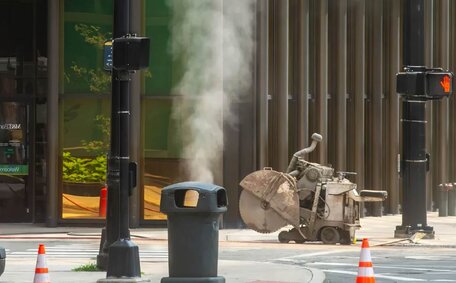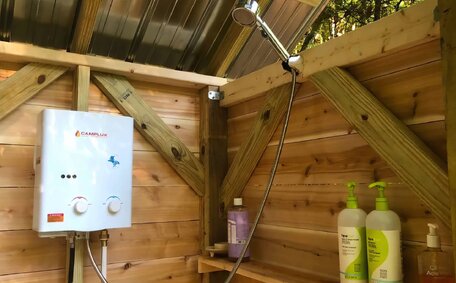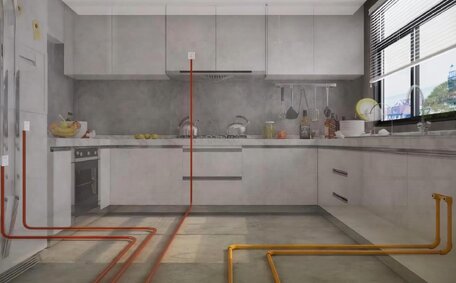
How To Move A Gas Meter
Need your gas meter relocated? You can’t move it yourself - contact your supplier to arrange for a gas engineer to reposition it safely. Charges may apply depending on circumstances.
Read MoreDetecting a damaged gas line involves recognizing several key indicators:
Stay alert for these signs and promptly address any compromised gas line to prevent hazards.
If ignored, gas leaks can lead to dire scenarios including explosion perils, carbon monoxide poisoning, choking hazards, or severe fires.
Use your sense of smell as a primary method to detect potential gas leaks. Utility companies add a 'rotten egg’ odourant to odourless natural gas to assist in detecting leaks.
A faint gas odour within or surrounding your premises warrants caution and immediate contact with gas line experts, as it likely signifies an underlying leak.
Avoid turning on or shutting off lights and electrical devices which could produce sparks and trigger an explosion. Vacate the premises immediately and from a safe distance, contact gas support services or the fire brigade.
Inspect your home to locate the strongest gas smell; this helps identify potential leaks. Engage a qualified plumber gas inspector to assess fixtures like your furnace, water heater, stove, fireplace, etc., for safe operation. A stronger smell is most likely indicative of a larger leak.
If safe, shut off the gas supply by turning off the main gas valve, taking care to avoid open flames or sparks.
Locating source leaks and preventing damage to hidden or hard-to-reach underground gas lines can be challenging. For accurate detection and effective resolution, enlist professional plumbing gas line repair services.
Hissing or whistling noises may signal an urgent gas line issue in your home. If you hear a hissing sound coming from the gas metre, any gas appliances, Outdoor gas lines, or anywhere inside near gas fixtures, evacuate all occupants to avoid potential damage to your home and contact emergency services right away.
You should turn off your appliances and not attempt to investigate the source of strange gas-related noises unless you know how to do so safely. Have qualified professionals use specialised equipment to locate possible leak sources.
Do not strike a match or flip any switches, as these actions could aggravate a potential gas line issue. Such sparks could ignite leaking gas when a gas leak occurs and cause an explosion.
Apart from hissing or whistling, other gas sound warning signs to heed include audible rumbling or roaring from gas appliances, a gusty or tearing noise due to fissures in buried gas lines outdoors, or appliance pilot lights that extinguish with a distinct “popping” noise.
Take all gas-related sounds seriously and understand you might need gas line inspections to act fast. Promptly engaging certified technicians at the first suspicion of a gas line issue can mitigate danger and protect your home from potential disasters. In some cases, even minor leaks that are small enough not to smell may still make noises, so it is vital not to ignore subtle audio cues.
There are also visible signs to watch out for that may reveal issues within your gas system. Indoor or outdoor gas pipeline irregularities such as cracks, rust, dents, or other damage are clear indicators of potential threats.
Dead vegetation along buried gas lines outdoors may indicate hazardous leaks; monitor your garden for these signs. Dirt blowing from an underground crack or plants dying due to gas exposure underground are red flags. Indoors, yellow flame tips, soot buildup or continually blown out appliance pilot lights point to trouble.
Before digging, confirm that no gas leak detection is necessary to avoid harm. Hire an accredited plumbing services company to assess areas with visible line damage on your property and prevent fires or detonations from undetected breaches. Regular monitoring is essential to determine if aging gas lines need repair.
Noticeable and unexplained changes in your surroundings near gas lines may also indicate leaks. Gas exposure can cause plants and grass to die.
If you examine your home and see spots or browning vegetation in a linear pattern, these are signs your gas lines may be compromised by a potentially hazardous underground gas leak. Also look for any new cracks or dirt blowing in your yard near gas lines, as this may reveal shifting soil due to an underground gas leak.
Likewise, inside your home you may notice issues near appliances, like sooty buildup on walls behind gas appliances or recurrently blown out pilot lights. Such visual alerts reveal issues your gas line components may have, signaling the need for professional evaluation and it is crucial to arrange inspections before grievous complications emerge.
Exposure to a compromised gas line can pose serious health risks. Inhaling gas can cause symptoms like dizziness, escalating to breathing difficulties or loss of consciousness at high concentrations due to oxygen displacement. Long-term exposure may also result in asphyxiation risks, as breathable air is displaced.
Gas leaks also present a significant explosion risk if the flammable gas ignites. Related blasts can result in traumatic injuries. Fires ignited by escaping natural gas can also commonly emit toxic fumes themselves.
Since natural gas is odourless, many utility companies add a chemical “stench” called mercaptan for leak detection. In some sensitive individuals, this rotten egg smell itself can trigger headaches, eye and nasal irritation if inhaled in quantity.
If you experience any physical symptoms that may be linked to a gas leak like dizziness or breathing issues, it’s a signal that possibly your gas lines need inspection, so get fresh air immediately and call emergency medical services. Acquiring prompt professional assistance to evaluate and address the underlying leak is critical for your health and safety.
Gas appliances that are malfunctioning or not operating properly can signal underlying issues with your gas lines that require attention. Key things to watch for, indicative of a problem with the gas in your system, include:
These indications warrant prompt scrutiny by a gas line repair service as they commonly suggest a gas line blockage or that your appliances are combusting gas ineffectively. This could hint at low gas pressure affecting your gas hot water system, from a potential leak, a line blockage, or damage to the pipes.
It’s vital to schedule regular maintenance checks for all your gas appliances, as small unchecked issues can escalate into serious safety hazards.
Technicians can find issues you can’t find on your own with their specialised equipment and determine if you need gas line repair. Addressing appliance irregularities quickly could reduce the need for gas line interventions in the future.
An unexpected increase in your gas bill, particularly during warmer months when usage is lower, may indicate a leak in your gas line system. Small leaks can actually over time waste a significant amount of gas in your home, driving your bills up.
If your current energy bills exceed those of the same period last year, it’s advisable to engage professional gas services for an inspection.
If usage and costs have markedly increased without any lifestyle or household changes to account for it, an issue your gas line might be the cause, such as a leak, may be likely. Monitoring utility bills is one of the only ways you may catch a smaller, hard to detect gas leaks that do not have strong odour or other symptoms.
At the first hint of discrepancy in your utility bills, contact gas line services immediately to inspect your system. Left unchecked, even minor leaks could worsen over time and lead to dangerous gas accumulation, explosion risks, health issues or long term pipe damage needing expensive repairs down the road.
Suspecting issues with your gas lines necessitates the immediate attention of qualified experts for inspection and repairs. Only licenced gas technicians have the expertise to thoroughly assess for leaks, determine underlying causes, and fix any pipe damage or blockages safely according to code.
DIY remedies for gas systems risk dangerous errors leading to leaks, explosions, or health hazards due to insufficient containment. Legally, certified, licensed gas professionals can only service gas structures, ensuring safety and regulation compliance. Menai Plumbing’s team possesses the qualifications and certification required to adeptly handle gas line issues.
During professional inspection, technicians utilise specialised leak detection equipment and pressure gauges most homeowners lack. This allows pinpointing leak locations and sizes accurately. Damaged sections of gas pipe are identified, your gas line needs may include replacing compromised sections and testing for safety assurance. With regular maintenance checks, you can address concerns proactively rather than waiting for a system failure, maintaining the integrity of your gas system and preventing minor issues from becoming dangerous.
For dependable gas line evaluations and assured safe, correct restorations, check your systems with our licenced staff at Menai Plumbing, suited for both home business environments. We have the tools and knowledge needed to fix all gas pipe and appliance issues promptly and prevent disastrous failures.
Upon noticing any potential signs of a gas leak, call your local gas technician without delay. Key situations requiring immediate assistance include:
Technicians from Menai Plumbing have the specialised equipment, expertise, and certifications to accurately identify leaks and safely call gas line repair issues. Attempting to fix gas line problems yourself risks errors and violations. Only licenced professionals can legally address gas leaks and prevent pipeline damage to your property according to code.
Besides obvious gas leak symptoms, also call our team for:
For prompt, reliable assistance day or night, contact our certified gas fitter professionals at 1300 349 338 or [email protected]. Addressing problems early prevents costly repairs and disasters down the road.
Preventative maintenance is crucial for maintaining the safety and performance of gas lines. By scheduling annual inspections from qualified technicians like Menai Plumbing, you can inspect your gas systems and address minor issues before they lead to dangerous, expensive problems.
There are several key preventative steps all homeowners should take:
Our technicians utilise cutting-edge diagnostics to inspect gas systems for:
We’ll perform essential repairs to ensure the long-term safety of your gas infrastructure. Contact Menai Plumbing at 1300 349 338 to schedule preventative maintenance and take control of your gas line health.
Need your gas meter relocated? You can’t move it yourself - contact your supplier to arrange for a gas engineer to reposition it safely. Charges may apply depending on circumstances.
Read MoreInvesting in a solar hot water system can save up to 75% on water heating costs. With great returns and added home value, solar hot water can be a smart choice over electric or gas heaters. Contact us to see if it’s the right investment for your home.
Read MoreWhile natural gas and propane can both power appliances in your home, they have notable differences when it comes to BTU output, infrastructure, safety, cost and more. Understanding these key contrasts will help you determine which is better for your specific needs.
Read MoreMenai, 2234 NSW
We will call back as soon as possible.




